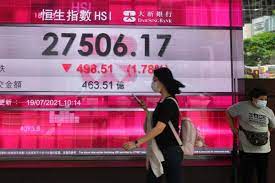Tokyo, July 19:Asian shares fell across the board Monday, as pessimism took hold following rising COVID-19 infections regionally and Wall Street’s first weekly loss following three weeks of gains.
Japan’s benchmark Nikkei 225 shed nearly 1.2 per cent in early trading to 27,677.60. South Korea’s Kospi slipped 0.9 per cent to 3,247.68. Australia’s S&P/ASX 200 dipped 1.2 per cent to 7,261.60. Hong Kong’s Hang Seng fell 1.6 per cent to 27,561.41, while the Shanghai Composite edged down 0.5 per cent to 3,523.01.
“Asia stocks look set for a weak start,” said Yeap Jun Rong, market strategist at IG.
“This comes as investors look beyond positive catalysts such as corporate earnings outperformance, focusing on several risk factors,” such as higher inflation and more COVID-19 cases.
Outbreaks are growing in Indonesia, Malaysia and Thailand, as well as parts of Japan, including Tokyo, where the Olympics are set to open Friday. The first cases among athletes in the Olympic Village were confirmed Sunday.
“The more transmissible delta variant is delaying the recovery for the ASEAN economies and pushing them further into the doldrums,” said Venkateswaran Lavanya, at Mizuho Bank in Singapore, referring to Southeast Asian nations.
A good part of the pullback on Wall Street was attributable to declines in big technology stocks, like Apple and Amazon, as well as banks and companies that rely on consumer spending.
Energy and industrial stocks also helped drag the market down, outweighing gains in health care and utilities companies.
The S&P 500 fell 32.87 points, or 0.8 per cent, to 4,327.16. It ended the week with a 1 per cent loss.
The Dow Jones Industrial Average dropped 299.17 points, or 0.9 per cent, to 34,687.85. The tech-heavy Nasdaq composite slid 115.90 points, or 0.8 per cent, to 14,427.24.
The Russell 2000 index of smaller companies fared worse than the broader market, shedding 27.06 points, or 1.2 per cent, to 2,163.24.
The index, which had outpaced the rest of the market for much of 2021, is now up just 9.5 per cent for the year, well below the S&P 500’s year-to-date gain of 15.2 per cent.
Stock in COVID-19 vaccine maker Moderna rose 10.3 per cent after the drugmaker was added to the S&P 500 index, prompting a rush of buying from fund managers who keep portfolios that replicate the index.
In a bit of positive economic news last week, Americans spent more last month on clothing, electronics and dining out as the economy opened up and there were fewer pandemic-related restrictions.
US retail sales rose a seasonal adjusted 0.6 per cent in June from the month before, the US Commerce Department said Friday. The increase was a surprise to Wall Street analysts, who had expected sales to fall slightly last month.
Investors’ attention now turn to earnings. The bulk of companies will report their results this week and in following weeks. Expectations are high, with profits in the S&P 500 expected to be up 64 per cent from a year earlier, according to FactSet.
In energy trading, benchmark US crude lost 74 cents to USD 71.07 a barrel. Brent crude, the international standard, fell 82 cents to USD 72.77 a barrel.
In currency trading, the US dollar fell to 109.90 Japanese yen from 110.08 yen. The euro cost USD 1.1803, inching down from USD 1.1805. (AGENCIES)
Trending Now
E-Paper


